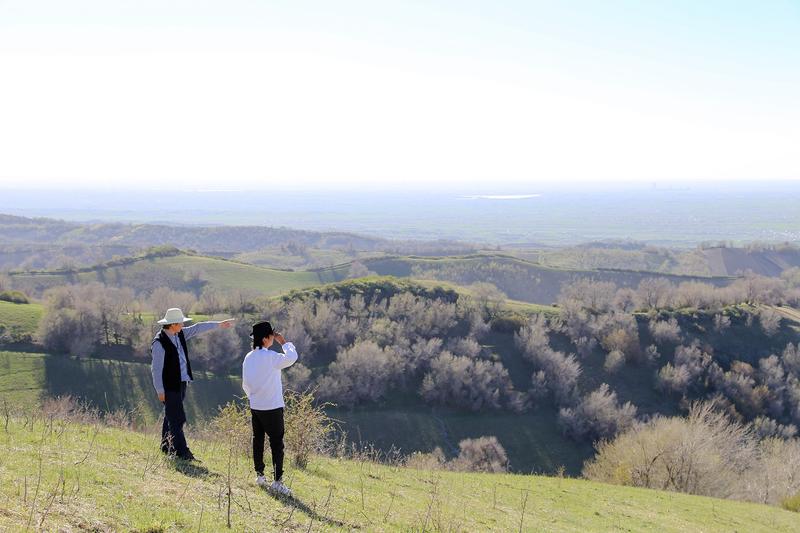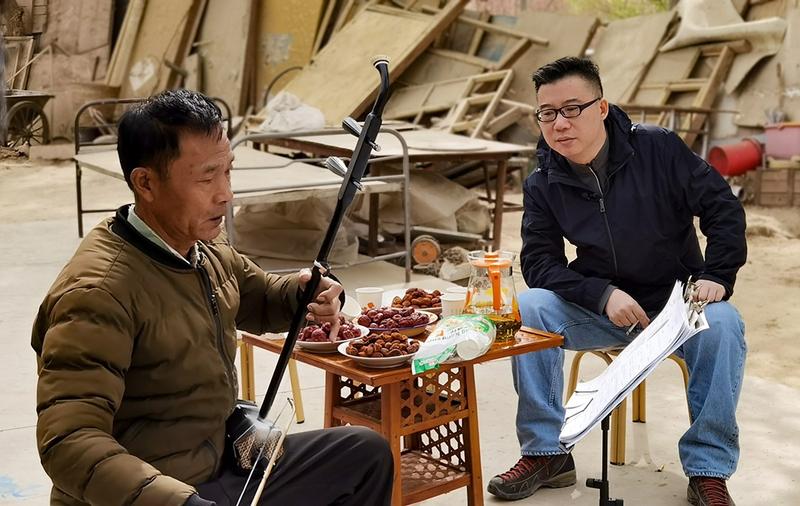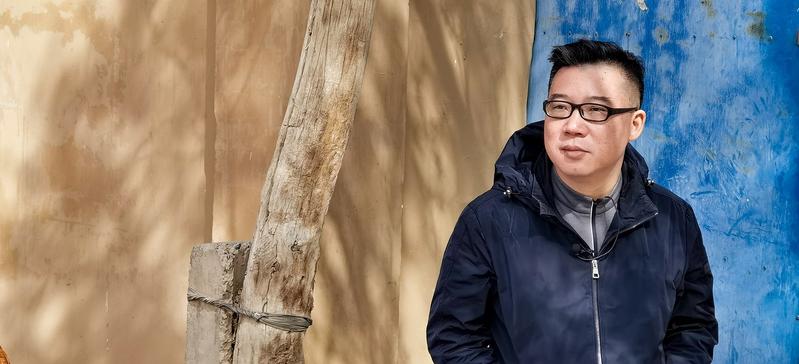Documentary series delves into the minds of prominent authors as they travel with their closest friends, Zhang Lei reports.
 Writer Liu Liangcheng (left) admires the Xinjiang scenery with his singer friend Hong Qi. (PHOTO PROVIDED TO CHINA DAILY)
Writer Liu Liangcheng (left) admires the Xinjiang scenery with his singer friend Hong Qi. (PHOTO PROVIDED TO CHINA DAILY)
"We can describe a dandelion simply in a hundred words in botany, but the real dandelion growing in soil can't be summed up in a few lines," says Liu Liangcheng in the documentary Being a Writer.
"When you stand next to a dandelion, you can smell its fragrance; when you blow its seeds off, some of your thoughts fly off with them."
Literature is like a wall behind our back, that we can lean against to have a rest.
Li Xiuwen, writer
Liu, 60, who has been described as "China's last exponent of prose of the 20th century", says scientific knowledge blocks the cognition humans use to communicate with plants and animals.
"Our language was initially created to communicate with all life," he tells his friend, the singer Hong Qi, standing on the grasslands of the Xinjiang Uygur autonomous region, after trying to talk to a lizard he had just encountered.
"First we name them, then we describe their appearances and postures. By doing this we get closer to a plant or animal little by little. This language system has gradually disappeared."
The second season of Being a Writer began airing on the mainland TV channels Straits TV and Southeast TV, and the streaming platform Youku, on April 21. The six-episode documentary chronicles the trips of six well-known Chinese authors with their friends, during which they discuss their understanding of life.
Wang Shengzhi, 47, director of the series, says that sometimes writers are zoologists, sometimes botanists and sometimes specialists in life, because the way they see life is different from that of others.
"Writers definitely love life. There are too many details that are worth their love," he says.
 Novelist Shuang Xuetao (left) visits Beijing's Shichahai Lake with scriptwriter Shi Hang in the fourth episode of the documentary. (PHOTO PROVIDED TO CHINA DAILY)
Novelist Shuang Xuetao (left) visits Beijing's Shichahai Lake with scriptwriter Shi Hang in the fourth episode of the documentary. (PHOTO PROVIDED TO CHINA DAILY)
Wang is known for directing food documentaries such as Breakfast in China and Xiafancai (dishes that go well with rice). They tell the stories of ordinary people who make food.
Wang, who has a master's degree in Chinese literature, turned his lens to Chinese writers in 2019 and presented the first season of the documentary the following year.
Even though his documentaries cover different fields, all of them look at the way people, be they chefs, writers or something else, live.
"When I made the first series, I was bereft of confidence, but I was surprised to see the thousands of comments on (review website) Douban, and I realized that many people really do still read books."
In both seasons, Wang invited authors who enjoyed reading their works to join the show, but not all accepted the offer, with some saying they wanted to leave their readers with a sense of mystery.
Wang says he is happy that Liu is satisfied with the documentary, because everything the writer wanted to express is fully presented.
What Wang says he values the most in the program is the writer's ability to dream. As people become more immersed in the digital world, communication, one would think, would be easier, whereas, in actuality, people are becoming more isolated, he says.
"Writers create soulful communication through words, which these days are what everyone needs," he notes.
 Writer Li Xiuwen (right) is entertained by a musician during his trip to Gansu province. (PHOTO PROVIDED TO CHINA DAILY)
Writer Li Xiuwen (right) is entertained by a musician during his trip to Gansu province. (PHOTO PROVIDED TO CHINA DAILY)
Wang says that what impresses him about Liu talking to a dog or a dandelion is his sense of imagination.
"Once he came across a few pieces of a broken beer bottle in the desert, he assembled them and conjured up the idea of a shepherd passing through the wind-swept place and spending a night there with a bottle of beer. He's like a child.
"Every writer is different, but they do have one thing in common-even though they seem mature, they're innocent and have a child's curiosity of the world."
Wang says it can be a challenge for him to film the writers, because he regards each of them as being stronger than him. Meanwhile, what the crew finds hardest when filming is to understand what the writers are saying, he says. It may take them a few minutes to cotton on and begin to think about what images can be used to match the writer's narration.
This difficult production process turns out to be very fruitful, Wang says. He has read Landscape Kasaya, the collection of prose written by Li Xiuwen, the writer in the third episode, three times, and he says that he is impressed by how Li writes about daily life in such an arresting way.
"His book made me realize that I can't wait for dramatic things to happen to make a documentary, and that I can learn to find the poetry and drama in daily life. He's my favorite writer," Wang notes.
The highlights of the second season are friendship and wandering. The loneliest person usually has the most persistent friend, while most writers stay alone in their spiritual garden, Wang says.
"Once you find the right friend, a writer can open his (her) mind," he says, adding that he thinks writers' charm is truly revealed only when they speak from their heart.
The first season was filmed mostly in the writers' homes, whereas in the second, Wang asked them to go out with their friends, and as their journeys progress, the topics they discuss become more profound.
"Sometimes there is no specific destination, they just wander, and they are relaxed," Wang says. "I don't want the show to become a class, in which the writers talk about a bunch of major principles. This should be the bedtime conversation in a college dorm between friends, one that is all free thought and expression."
 Li Xiuwen, writer. (PHOTO PROVIDED TO CHINA DAILY)
Li Xiuwen, writer. (PHOTO PROVIDED TO CHINA DAILY)
Writer Li Xiuwen says he had long planned to travel to Dunhuang in Gansu province with his friend and fellow wordsmith Han Songluo. The third episode of the current season chronicles that trip.
Li says he used to be very camera shy, but his admiration for Wang's way of expressing himself persuaded him to be filmed.
"Wang is able to let you forget that the camera is there," Li says.
"I had planned to revisit Dunhuang, where I would go once or twice a year before the pandemic, so the trip with Han has long been on the cards."
Han lives in Lanzhou, Gansu's capital. Visiting a place with a local friend rather than alone makes a lot of differences to the experience, Li says.
"Dunhuang is like a petrol station for me. Whenever I find my bones getting soft, or my aesthetics becoming faint, I travel to the northwest," he adds.
Li, born and raised in Wuhan, Hubei province, says he regards the northwest as his spiritual home.
He first went there around 2006 when he took a monthlong road trip with his friend. The desert scenery and the strong winds made a deep impression on him, he says.
"It's as though you're entering a new world and turning on some kind of new life force, making it feel like your spiritual home. You even opt for different words as you are writing. It really changed me," Li explains.
For a writer, or for anyone for that matter, one of life's assignments is to continuously rediscover oneself, he suggests.
The latest trip to Gansu inspired his writing anew, just as earlier visits had done, he says.
Li and Han once saw a man hitting samaras from an elm tree and stopped to talk to him. He invited them to his home and, outside, he served the fruit and told them about himself. He even sang a song for them, Li says.
"We would never have heard this story if we hadn't stopped and chatted to him," he notes.
Crossing the Gobi Desert by car, Li and Han talk about what a writer's mission is.
"The writer is the trumpeter in the vocal palace hall," Li says.
The function of literature is this, he says: "After reading other stories we realize that everybody else has gone through the same kinds of pain and met with the same kinds of joys that we have experienced, which proves we are not alone.
"Literature is like a wall behind our back, that we can lean against to have a rest."
Wang's views on the role of literature are similar to Li's, and he says he believes that, with words, writers comfort people.
"I've told myself that this era may not belong to writers, because it's a time of artificial intelligence and 5G."
However, he adds that, perhaps, this is the best time for writers for that very reason.
Contact the writer at zhanglei@chinadaily.com.cn


